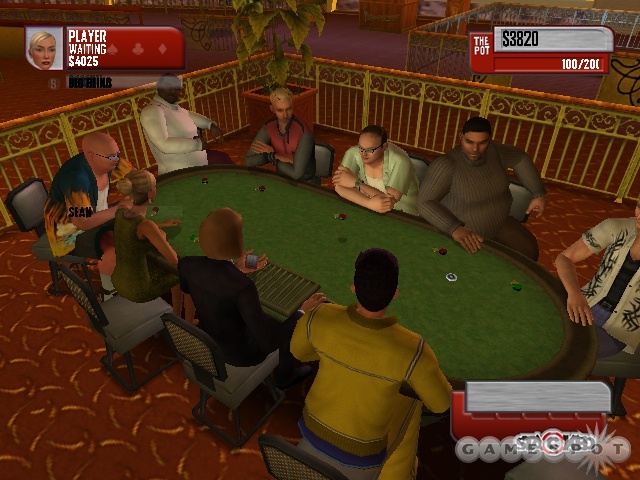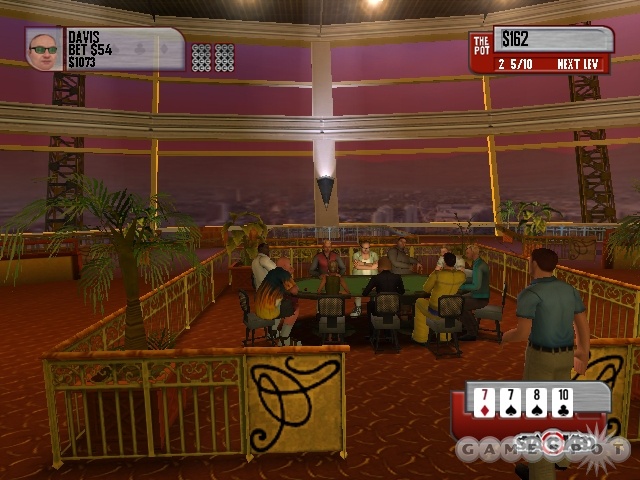Stacked with Daniel Negreanu Hands-On
We sit down for a few rounds with poker star Daniel Negreanu's new game, Stacked.
We got a chance to play around with early Xbox and PC builds of Stacked with Daniel Negreanu, a new poker game being published by Myelin Media. Aside from Negreanu, who is widely regarded as one of the world's most imaginative and dynamic poker players, Stacked will include input and appearances from eight other well-regarded poker pros, including last year's World Series of Poker main event runner-up, David Williams, the brash and outspoken Josh Arieh, top female player Jennifer Harman, and heartthrob Evelyn Ng. While many poker games simply try to cash in on the nation's newest fad, Stacked is taking a more serious tack by touting its artificial intelligence, which is powered by a special poker engine. Poki, as the engine is called, has been in development for more than 10 years by the game theory department at the University of Alberta. The impressive credentials promise the most sophisticated AI ever seen in a poker video game.

The preview builds of Stacked that we tried offered only some basic features. You begin by creating an avatar and customizing their appearance, face, clothes, and even accessories like hats and glasses. From there you'll be able to start your career at public games, working your way up through ranks of tournaments until you're finally playing in professional games against the digital versions of top pros such as Negreanu and Williams. The game includes several different types of hold 'em formats, including limit and no-limit, in live game format as well as in single- or multitable tournaments. The final version of the game will include the full career mode, called poker school, where you can get tips from Daniel and the other pros, as well as a complex online ranking system where you can test your poker mettle against other real-life players. Entry into the Stacked "Masters" events will be governed by buy-ins from your online point earnings, or by winning satellite events in the single-player mode. You'll also get the opportunity to play against some of the game's featured pros.
From what we can tell so far, even in the alpha version, Stacked's AI seems to be a lot smarter than AI in other poker video games. During the opening rounds of a no-limit tournament, most AI players will call in an attempt to see a lot of flops, while the blinds that are low remain low. As the blinds get raised, and the stakes get higher, the AI seems to get noticeably more conservative, folding much more before the flop, rather than risking a good percentage of their stack on marginal hands. There's a lot less random raising or calling you down to the river with no hand, as we've seen in many poker video games. Computer players in Stacked will actually release their hands when they haven't improved, even if they've raised earlier in a hand. Again, this behavior stands in stark contrast to many current poker games on the market where the AI players seem to act with random or reckless abandon.
That's not to say we haven't seen any obvious gaffes in Stacked's AI. As the blinds get higher and higher in a single-table tournament, we've seen computer players call all-in bets outside of the blinds with some rather suspect hands, like Kx or even Qx. We've also seen the AI fold their raises to a small all-in reraise, a situation which would be an obvious call in most circumstances. Despite this, the overall level of poker displayed by the AI opponents on hard difficulty shows us some promise that the final version of Stacked may be able to offer up worthy AI opponents for poker enthusiasts.

We also took note of Stacked's presentation. Players at the table are rendered in full 3D, complete with animations and voices. What's interesting is that there are a number of different options available to you as the cards are being dealt and as the AI players take their turns betting. You can get a first-person view of the table, a viewpoint which would presumably let you study other characters for tells. There are also placeholder buttons, which we suppose will let you purposefully toss out different expressions, perhaps to allow you to bluff more effectively.
Our primary complaint thus far with the basic mechanics of Stacked is that playing a hand takes too long. In real-life card rooms and casinos, people usually fold, call, or bet hands quickly and wordlessly. In Stacked, every fold, call, or bet seems to be a dramatic experience, with full sentences (which get repetitive) announcing the action, and then a theatric animation of the character tossing chips in the pot or pushing his cards away. The dealer even seems to take her sweet time putting down the community cards. You'd think that playing a hand of video game poker shouldn't take as long as it really would in a real-life situation, where real cards must be shuffled and dealt, as well as chips stacked and pushed around. But it does seem as though playing a hand in Stacked takes longer, so hopefully this issue gets addressed before release.
While the presentation of the game has some definite rough edges at this point, we've seen some encouraging signs of logical, intelligent play from the AI. We're even more excited that the game will actually include ranked online modes, so even if the AI doesn't end up playing quite up to your speed, you'll be able to take on human opponents. Stacked is currently slated for release in the fall of this year for the PC, Xbox, PlayStation 2, and PSP.
Got a news tip or want to contact us directly? Email news@gamespot.com
Join the conversation